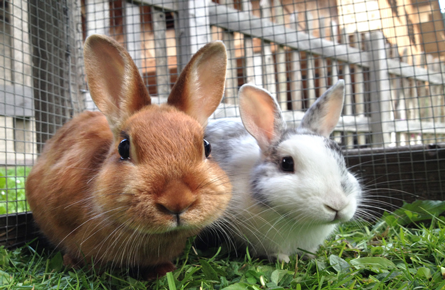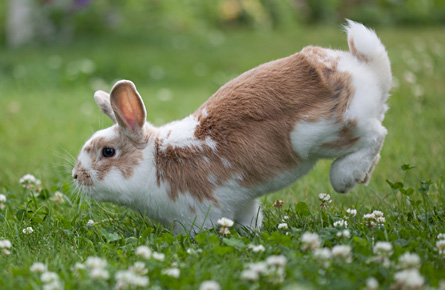Rabbit neutering normally happens when your pet is four months old. A male rabbit's testes are removed during castration, and a female rabbit's uterus and ovaries are removed during spaying. Because sperm can stay in the genital tract for up to six weeks, it's advisable to keep your rabbit away from females who are unneutered during this time period. Due to their high level of social interaction, rabbit neutering can help with pairing and bonding. This helps make our floppy-eared friends much happier creatures!

Benefits of Rabbit Neutering
There are more beneficial factors to rabbit neutering than you might realise:
- Health benefits: Rabbit neutering can prevent certain cancers (such as uterine and testicular cancers) and reduce the risk of reproductive-related infections in rabbits.
- Behavioural changes: Neutering male and female rabbits can frequently reduce their aggressive behaviour. It may lessen spraying, territorial marking, and other actions associated with dominance.
- Bonding: Rabbit neutering can make it easier for them to bond, especially if you're introducing rabbits of opposite genders. Unneutered rabbits might not get along due to hormonal behaviours, making bonding challenging.
- Longer lifespan: Because they are less likely to suffer from certain health problems, neutered rabbits often have longer, healthier lives.
Rabbit Neutering at Gower Vets
Our rabbit neutering process goes like this.
On Arrival
Kindly ensure that your rabbit is transported in a safe and sturdy container, preferably with a blanket that reminds them of home. It is recommended that rabbits be carried with their friends to lessen the anxiety of being apart from one another. It's also best to pack their lunch. After receiving a general anaesthetic, we require the rabbits to eat rather rapidly. Having their favourite foods on hand will shorten the time it takes them to heal, and enable you to reunite with your rabbit as soon as possible.
During the process
For rabbit neutering, as mentioned, your pet needs to be given general anaesthesia; at Gower Vets, we have procedures in place to guarantee their safety throughout the process. Throughout the procedure and the healing period, your pet will be closely observed by a committed Registered Veterinary Nurse (RVN). Although anaesthetic for rabbits is considered to be "high risk," the advantages to health alone greatly exceed the dangers, and rabbit anaesthesia has grown significantly safer over time.
Age, breed, and any underlying medical issues your pet may have, all raise a risk of anaesthesia. In addition to two different forms of pain management, your pet will receive a premedication to help them relax. You can be confident that your pet will have the Gower team on their side at every hop.
After the process
After rabbit neutering, your fluffy friend will need to stay the day with us. We will go over the permission form and the protocol upon admittance. Please be aware that the consent form needs to be signed by the registered owner (who must be above 18) or an authorised agent. Your dog, cat, or rabbit will be admitted as a "day patient," and if our team is satisfied with how well your pet has recovered, they will be released later that same day. The staff will go over all the information you require on your pet's post-operative care and pain medication during your pet's discharge appointment. After your pet has settled in, please call us at 01792 299111 with any more queries. We are always here to help you and your pet.

Frequently Asked Questions about Rabbit Neutering:
Should I let my rabbit have one litter before spaying her?
It's a frequently asked issue, but there are no established health advantages to allowing your rabbit to have a litter—the same goes for dogs and cats.
At what age should I neuter my rabbit?
For males, neutering can happen at 12 weeks of age, while for females, it can happen at 16 weeks. However, if you are still unsure, our team of vets here at Gower can advise you on when is the best time for you and your rabbit.
How long does it take to recover from rabbit neutering procedures?
After surgery, a male patient is often back to their regular activities in a few days. It could take a little longer for a female to heal from a spay. You can be confident that your pet will have our Gower team with them during their recovery stage to ensure everything is how it should be and everyone can return home happy and safe.
Contact us today | Book a rabbit neutering appointment
Please contact Gower Vets with any additional queries you may have about our rabbit neutering services. We would be pleased to address any questions or worries you may have.





